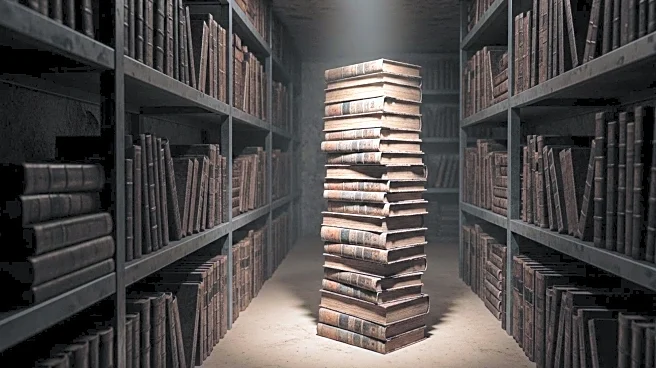What is the story about?
What's Happening?
A significant discovery of rare Jewish religious books has been made in the basement of a Jewish-owned building near the Nożyk Synagogue in Warsaw. These books, believed to be part of the legendary Library of the Chachmei Lublin Yeshiva, were found in approximately 40 to 50 sacks, weighing up to 1.5 tons, and are in severe disrepair due to mold and fungi. Experts are currently working to preserve these historical texts. The books identified as belonging to the Lublin Yeshiva will be transferred to Lublin, while others will be distributed among museums, libraries, and inactive synagogues dedicated to preserving Jewish memory. The discovery also includes fragments of Torah scrolls and wooden columns engraved with donors' names.
Why It's Important?
This discovery is crucial for the preservation of Jewish heritage and history, particularly in the context of the Holocaust, where many such artifacts were lost or destroyed. The books could provide insights into the cultural and religious practices of the Jewish community before World War II. The preservation efforts highlight the ongoing commitment to maintaining Jewish memory and heritage, which is significant for historians, cultural institutions, and the Jewish community worldwide. The potential identification of books from the Chachmei Lublin Yeshiva Library may help solve one of the great mysteries of Holocaust history regarding the fate of its collection.
What's Next?
The restoration process is underway, with experts working to disinfect and preserve the salvageable books. Once restored, the books will be distributed to appropriate institutions for further study and display. The discovery may lead to renewed efforts to locate other missing parts of the Chachmei Lublin Yeshiva Library, potentially uncovering more historical artifacts. The preservation of these books will also require ongoing support and resources to ensure their long-term safety and accessibility.
Beyond the Headlines
The discovery raises ethical and cultural questions about the preservation of artifacts from communities that have faced historical persecution. It underscores the importance of international cooperation in preserving cultural heritage and the role of local communities in safeguarding their history. The condition of the books also highlights the challenges faced by historians and conservators in dealing with artifacts that have suffered significant damage over time.
















